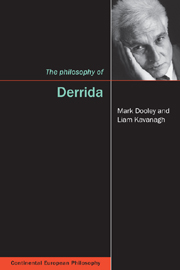Book contents
- Frontmatter
- Contents
- Preface
- Abbreviations
- 1 The catastrophe of memory: identity and mourning
- 2 Death and différance: philosophy and language
- 3 Repetition and post cards: psychoanalysis and phenomenology
- 4 The risks of negotiation: ethics and politics
- Afterword
- Notes
- Suggestions for further reading
- References
- Index
3 - Repetition and post cards: psychoanalysis and phenomenology
- Frontmatter
- Contents
- Preface
- Abbreviations
- 1 The catastrophe of memory: identity and mourning
- 2 Death and différance: philosophy and language
- 3 Repetition and post cards: psychoanalysis and phenomenology
- 4 The risks of negotiation: ethics and politics
- Afterword
- Notes
- Suggestions for further reading
- References
- Index
Summary
In this chapter we shall discuss the considerable influence of Freud, Husserl and Heidegger on the work of Derrida. We cannot underestimate the influence of these three thinkers on Derrida's deconstructive project. Derrida's first writings, his earliest articulation of the problems and questions that would occupy him throughout his life were a direct result of his critical engagement with Husserl's phenomenology, and the figures of Freud and Heidegger recur again and again throughout his work. Indeed, many of Derrida's deconstructive strategies – the trace, difference and deferral, the critique of presence – are prefigured in the works of these seminal thinkers. What particularly interests Derrida is the fact that all three challenge our conception of identity in terms of a teleology of memory. Whereas Plato, Hegel, Searle and Austin all think identity in terms of recollecting a determinate end (telos), of gathering the past into a harmonious whole, Freud, Husserl and Heidegger all think the catastrophe of memory in terms of repetition. But while Derrida's own conceptions of these themes are firmly rooted in his readings of Freud, Husserl and Heidegger, he argues that each ultimately fails to extricate himself from the circular enclosure of recollection. It is how we think our relation to death, loss and mourning that will determine the distance between Derrida and his illustrious predecessors. While Derrida's texts are littered with the spectral traces of ghosts and phantoms, there is ultimately no sense of mourning in Freud, Husserl or Heidegger.
- Type
- Chapter
- Information
- The Philosophy of Derrida , pp. 67 - 106Publisher: Acumen PublishingPrint publication year: 2006



